Learn to talk about seasons in French
Updated: 23 October, 2024 by Mylene in French Vocabulary ▪
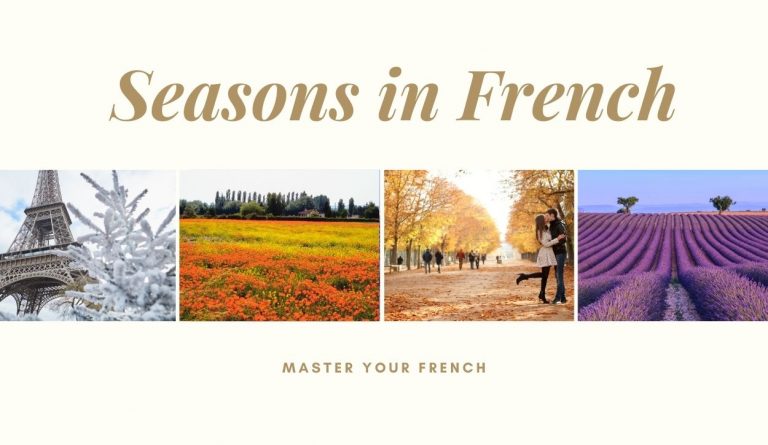
Learn the vocabulary related to seasons in French, along with their contextual use in the daily spoken French. In addition, you can listen to the audio recordings to hear how the seasons are pronounced in French.
In this post, you’ll learn:
- The seasons of the year in French
- How to pronounce seasons in French
- Different seasons in different contexts
After all, learning the names of the seasons is a basic part of learning a new language, as featured in our beginner’s guide to learning French vocabulary. Now let us discover all the names of the seasons in French.
What are the seasons of the year in French?
You already know that a year has 4 seasons. A season is “une saison” in French. In the plural, a silent s is added at the end of the word. For example, les 4 saisons (the 4 seasons). Here is the list of the seasons of the year in French.
| Saison | Season |
| Le printemps | Spring |
| L’été | Summer |
| L’automne | Fall |
| L’hiver | Winter |
Which months are in each season?
A quick reminder about the months in French. There are 12 months in a year:
- Janvier (January)
- Février (February)
- Mars (Mars)
- Avril (April)
- Mai (May)
- Juin (June)
- Juillet (July)
- Août (August)
- Septembre (September)
- Octobre (October)
- Novembre (November)
- Décembre (December)
The winter is l’hiver. It lasts from December, January, February, and March.
Spring is le printemps. It includes the following months: March, April, May, and June.
Summer is l’été. Summer’s months are June, July, August, and September.
Fall is l’automne. The fall includes September, October, November, and December. This season is also known as the autumn season.
Quick tip: En vs. Au
Use the preposition “en” to say:
- in winter: en hiver
- in fall: en automne
- in summer: en été
As for spring, use the preposition “au” as follows:
- in spring: au printemps
Gender and seasons in French
The saisons are masculine in French :
- Le printemps, un printemps
When le is used before the season in French, it’s reduced to l’ as the next letter is either a vowel or an -h:
- l’été
- l’automne
- l’hiver
Spring (printemps)
Spring is the season when nature awakens. With the first blooms of the season, nature is colorful and flourishing.
Easter is in Spring and is celebrated in many ways. Besides religious traditions, kids will get their Chasse aux oeufs (hunt for eggs) and chocolate-lovers will get wonderful chocolate sculptures of eggs, fish, chickens, and rabbits, among others.
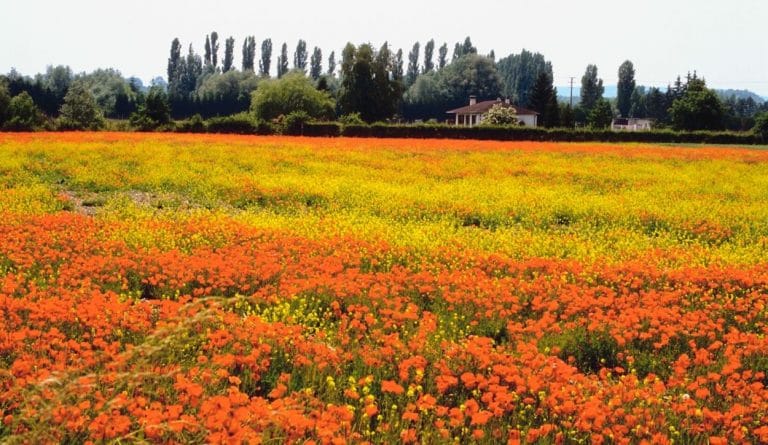
Spring season translates to printemps in French. The season of spring is from March 21-June 21.
Labor Day, La Fête du Travail (check the video here), another major public holiday in the French Calendar, is celebrated in France on the first of May.
Summer (été)
By the sea or in the mountains, France is a great place to spend your summer vacation and, humbly, one of the most visited countries in the world.
Check the map of the most visited countries in the world. C’est les vacances !
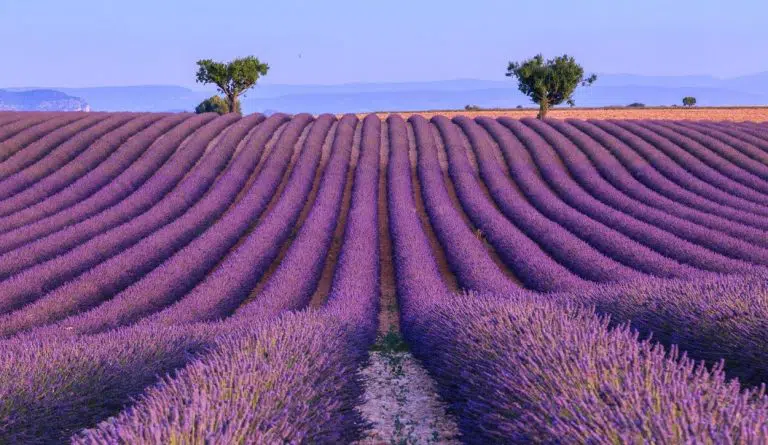
Summer is from June 21 to September 21. It is called été in French. The sunny season is traditionally the right time to take well-deserved holidays.
For tourism, July and August are the summer’s high-season periods in France. In the middle of summer, France celebrates Bastille day on July 14th.
Vive la France!
Fireworks, military parades, concerts, and balls are how French people celebrate their national day.
If you’re learning about seasons in French, you’ll want to learn about asking and telling time in French.
Fall (automne)
Temperatures tend to become moderate, but it is not unusual that days in September remain quite warm as part of what the French call an “Indian summer”.
After all, nothing signals the arrival of fall quite like the changing colors. Autumn’s colors are often various shades of yellow (jaune), orange (orange), purple (violet), and red (rouge). Read our article to learn more about colors in French.
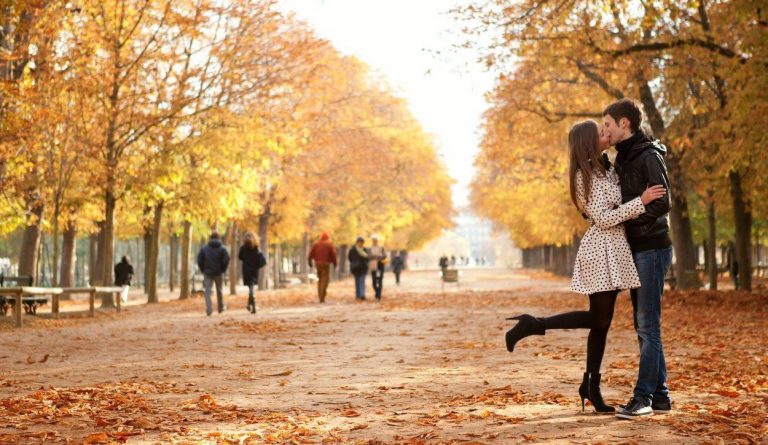
Fall (autumn) is from September 21-December 21 and it is the back-to-school season. In French, la saison d’automne means the fall season.
As for the celebrations in France, Halloween is one of them accompanying All Saints’ Day on the first of November.
Winter (hiver)
Winter is the coldest time of the year in terms of temperature. Snow is usually expected in many regions of France and is a great time for winter sports lovers.
With hundreds of ski resorts in France, choosing which one to pick might not be easy.
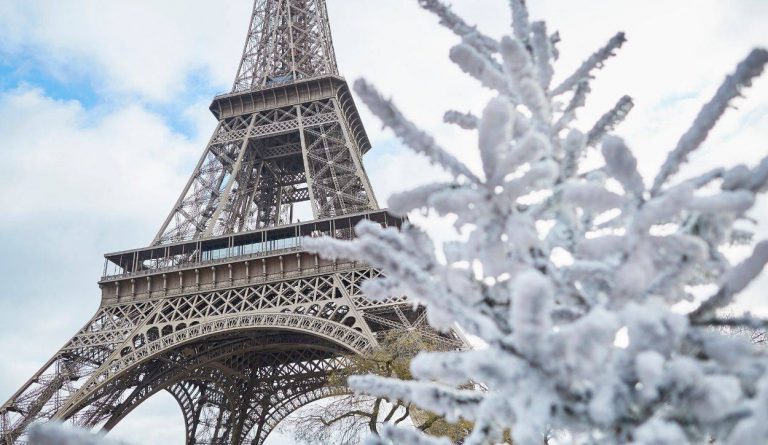
Winter is called hiver in French. The season of winter is from December 21-March 21.
Christmas is celebrated in France during the winter season. On January 1st, a new year is welcomed with a lot of hope and new resolutions. Valentine’s day on the 14th of February is an important celebration of love for couples in France as well as all over the world.
Find out how to improve your French this winter with Master Your French.
How to pronounce seasons in French?
Now that you know the French seasons, you can start the pronunciation exercise.
Below are the audio recordings of the names of the four seasons of the year in French.
Listen to learn then repeat to master the pronunciation of French seasons.
Click to listen to the audios:
Hiver [i vɛʁ]
Printemps [pʁɛ̃ tɑ̃]
Été [e te]
Automne [o tɔn]
Different seasons in different contexts
In addition to seasons of the year in the context of the weather, “une saison” in French can be used to describe a specific event that occurs over a defined period. Here are a few examples:
- La saison des vendanges
- La saison des fruits et des légumes
- La saison touristique
- La saison sportive
Let’s see together the details of each season.
La saison des vendanges
La saison des vendanges is the time when grapes are harvested. France is famous for its wine (vin). Different regions in France have different harvest times (saison des vendanges). I live in Bourgogne (Burgundy) so the harvest season typically falls between September and October. But why is it the best saison to harvest grapes? The time of harvest is determined by the ripeness of the grape, the weather…
La saison des fruits et des légumes
La saison des fruits et des légumes is getting more traction since a few years. Nowadays, in France, we are encouraged to choose les légumes de saison (seasonal vegetables) and les fruits de saison (seasonal fruits). So that we consume local vegetables and fruits!
La saison touristique
During the summer (July, and August), we’re talking about “la saison touristique” in French (touristic season). If you want to visit the South of France, my only advice is to try to avoid the touristic season!!! Prices are often higher, compared to other times of the year, and there are so many people!!! If your lifestyle allows you to travel other times of the year you’ll be able to enjoy this beautiful region by yourself.
La saison sportive
La saison sportive refers to the sports season. Many people are interested in different sports. if you’re interested in a or more sports, you know that there is a sports season for each Sport (Skating in Winter or Beach soccer in Summer, for example).
More seasons than you’ve imagined!
La saison des soldes. That means the sales season. In France, we usually have “la saison des soldes” in January and in July for 6 weeks.
Les vêtements de saison. In winter, people tend to wear warm clothes. Seasons define the way how people dress, and this is why we talk about seasonal clothes.
La saison d’une série. Episodes of a TV show that are released at regular intervals.
La saison des foins. The haymaking season. There is usually about a two-week “window” of time in which grass is at its ideal stage for harvesting hay.
Summary of the lesson
Although that one paragraph and a few lines about every season are never enough to describe a season, I hope that the explanations in this article will help you better understand the main characteristics of France’s unique seasons.
In this lesson, we reviewed the list of seasons in French. Let us recall what we have learned.
- There are 4 seasons in a year: hiver, printemps, été, automne.
- We explored how the word season is used in different contexts in the French language.
- You have access to the audio to learn how to pronounce seasons in French.
Now that you master the seasons in French, it’s important to keep improving your French level. As a next step, you can explore more French words as part of our French vocabulary list.
And for more videos, check out Master Your French on YouTube.

